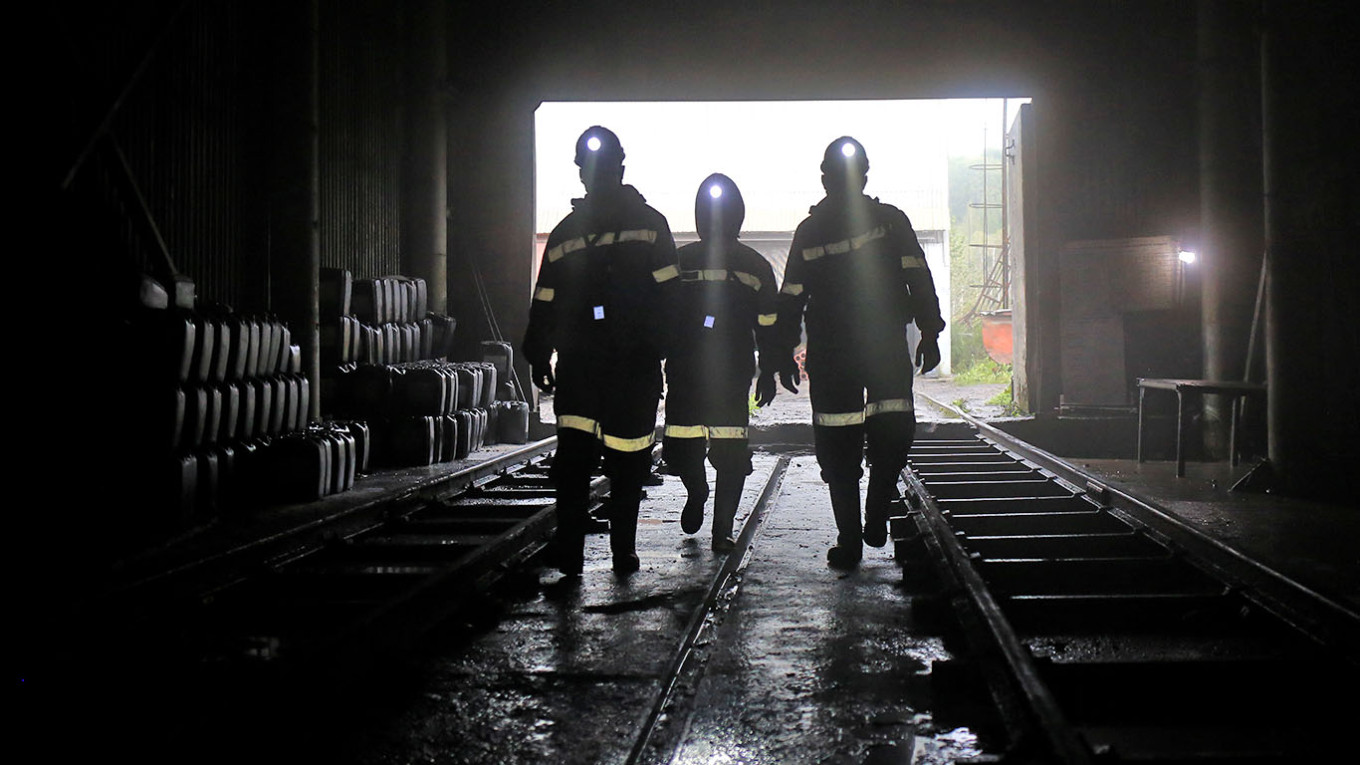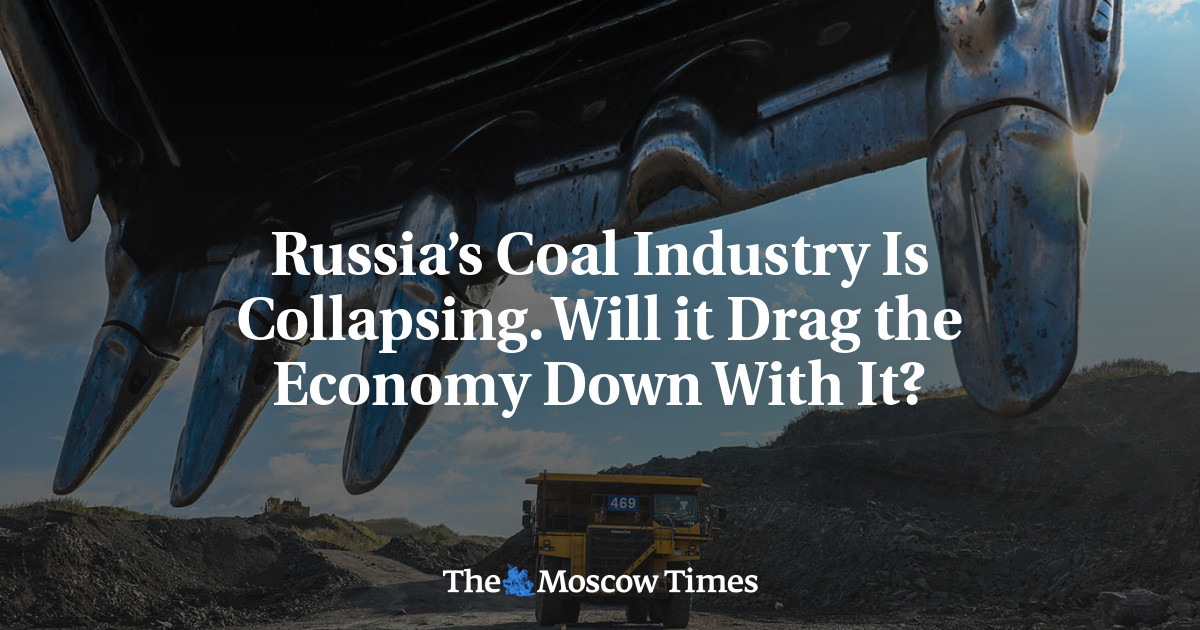Slumping global coal prices and sanctions have put Russia’s coal industry on the brink of collapse, forcing the government to intervene as it scrambles to protect both a key energy source and a major employer.
Why is the Russian coal industry in crisis?
Prices for both thermal coal, used in power generation, and metallurgical coal, critical to steel production, soared between 2021 and 2023 due to post-pandemic recovery and supply uncertainty stemming from the war in Ukraine.
But that boom has since gone bust.
Production has ramped up globally, particularly in China, India and Indonesia, while global demand has slowed. Consumption growth dropped from 4.7% in 2022 to just 1% in 2024, sending prices plunging from $400 per ton at the end of 2022 and beginning of 2023 to around $100 per ton by May 2025.
Russian coal, meanwhile, is selling at a steep discount.
Russia, which sold around 22.6% of its coal to the EU in 2021, was hit by a European embargo that forced producers to redirect shipments to Asia, where buyers have leveraged the disruption to negotiate lower prices.
Russian export prices fell to $69 per ton FOB at Far Eastern ports in late June — the lowest since 2020, according to the Vedomosti business daily. Under FOB terms, the seller covers delivery to the port but not sea freight.
The cost of producing and shipping one ton of thermal coal along the eastern route is estimated at 6,000 to 6,500 rubles. This means that, given the current strong ruble, the sale price of $70 per ton (some 5,500 rubles at the current exchange rate) does not cover the costs for many firms located away from the Far Eastern ports.
“At current prices, exchange rates, financing costs and rail and maritime logistics, thermal coal production in Kuzbass is unprofitable across the board,” said Roman Golovin, strategy director at the Siberian Coal Energy Company (SUEK), Russia’s largest coal producer.
Four of SUEK’s 10 coal enterprises have already scaled back operations or are weighing closures, he added.
The share of loss-making coal companies jumped from 31.5% in 2023 to 53.3% in 2024, according to official statistics.
Why is the industry important?
Despite the challenges, the government is unlikely to let the coal industry fail.
About half of Russia’s annual coal production is consumed domestically. Coal accounted for 12-13% of electricity generation in 2023 and plays an outsized role in regions like the Far East and the Kemerovo (Kuzbass) region of western Siberia, sometimes providing 50% or more.
Yakov & Partners, a Moscow-based consultancy, predicts coal’s share in Russia’s primary energy mix will remain at 10% through 2050.
When it comes to exports, demand for Russian coal could go up in the event of serious gas shortages amid geopolitical tensions. Similarly, increased manufacturing in countries like Vietnam and India can push coal prices up somewhat.
The industry also has major social importance. Roughly 146,500 people work in the coal industry in Russia and about 30 towns, mostly in the Kuzbass, are economically dependent on coal. A collapse would be catastrophic for these communities.

Bolshevik coal mine in the Kemerovo region.
Yaroslav Belyayev / TASS
What will it cost the government to rescue the coal industry?
The Russian government is supporting the coal industry through subsidies and tax breaks.
In May, President Vladimir Putin approved an Energy Ministry relief package aimed at stabilizing exports.
The ministry estimates the industry will need 178 billion rubles ($2.2 billion, according to spot foreign exchange market data published by Reuters) in aid this year, more than the 112 billion rubles ($1.4 billion) in losses reported in 2024.
Losses in 2025 could hit 300-500 billion rubles ($3.7-$6.2 billion), and total sector debt is forecast to reach 1.5 trillion rubles ($18.6 billion) by year’s end.
How does this impact the broader Russian economy?
Analysts say that while government support may keep the industry afloat, it does not address deeper issues like global market competition or the global transition to renewable energy. This implies state aid will need to stay consistent or even increase for years to come.
This won’t necessarily upend the federal budget, especially given that coal contributes relatively little to state revenues, a former Russian official with a background in market regulation told The Moscow Times on condition of anonymity.
At the same time, it could destabilize regional finances in Kuzbass and the republic of Khakassia, where coal taxes make up over a third of local income.
Economist Vladimir Inozemtsev told The Moscow Times that this is more of a social problem than a financial one.
He argued that although the government could likely cover annual support costs of up to 300 billion rubles ($3.7 billion) without fiscal collapse, “the real challenge lies in swiftly finding a new economic role for the Kemerovo region, which accounts for more than 50% of Russia’s coal production.”
“Concentrated discontent among specific professions or regions poses a greater risk to the authorities than general frustration with declining living standards among the general public,” he added.
Still, the coal dilemma hit the government at a politically inconvenient moment, with public finances already under strain, economist Alexandra Prokopenko said.
“Budget revenues are shrinking, the financial cushions are eroding and the National Wealth Fund is being depleted over the course of just three years. Politically, this means the government ends up propping up wealthy owners of inefficient enterprises — businesses that don’t really meet the demands of the time,” Prokopenko said.
Russia posted a record midyear budget deficit of 3.7 trillion rubles ($45.8 billion) after a 20% surge in spending during the first half of 2025. Analysts surveyed by the Central Bank expect the full-year deficit to reach 4.4 trillion rubles ($55 billion), or 2% of GDP.
Federation Council Speaker Valentina Matviyenko and Duma Budget Committee Chair Anatoly Artamonov have both called for spending cuts and greater fiscal discipline to keep the deficit from spiraling further.
A Message from The Moscow Times:
Dear readers,
We are facing unprecedented challenges. Russia’s Prosecutor General’s Office has designated The Moscow Times as an “undesirable” organization, criminalizing our work and putting our staff at risk of prosecution. This follows our earlier unjust labeling as a “foreign agent.”
These actions are direct attempts to silence independent journalism in Russia. The authorities claim our work “discredits the decisions of the Russian leadership.” We see things differently: we strive to provide accurate, unbiased reporting on Russia.
We, the journalists of The Moscow Times, refuse to be silenced. But to continue our work, we need your help.
Your support, no matter how small, makes a world of difference. If you can, please support us monthly starting from just $2. It’s quick to set up, and every contribution makes a significant impact.
By supporting The Moscow Times, you’re defending open, independent journalism in the face of repression. Thank you for standing with us.
Continue
![]()
Not ready to support today?
Remind me later.
×
Remind me next month
Thank you! Your reminder is set.
We will send you one reminder email a month from now. For details on the personal data we collect and how it is used, please see our Privacy Policy.
